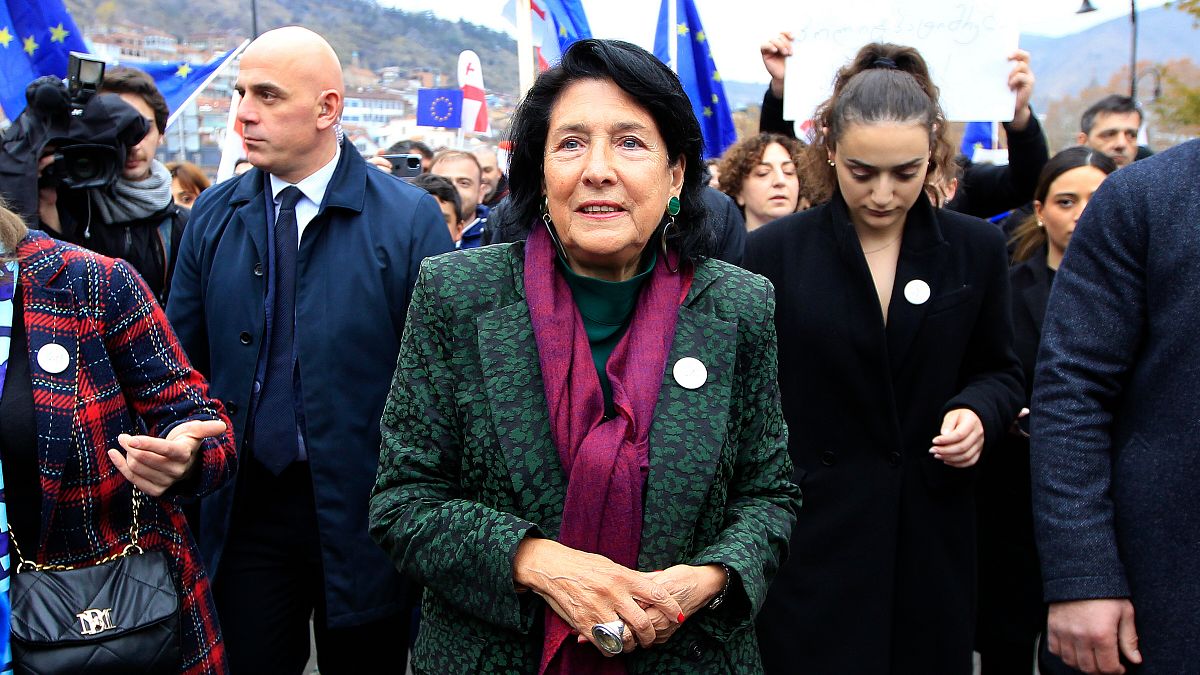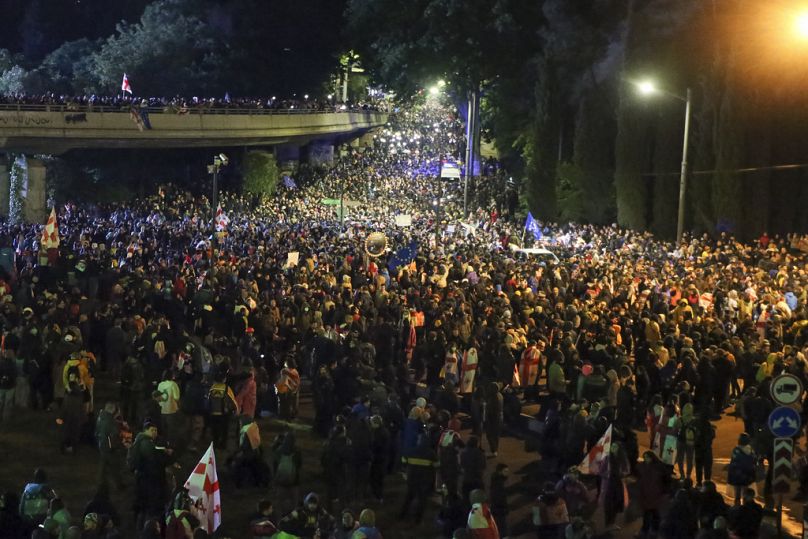Salome Zourabichvili has joined public demonstrations against a law that could turn Georgia away from Brussels and towards the Kremlin.
Georgian President Salome Zourabichvili has said she will veto a controversial bill passed by her country's parliament, calling the law "unacceptable" and reaffirming her opposition to a measure that critics describe as a dire threat to free speech and democracy.
In an interview with The Associated Press, Zourabichvili harshly criticised the ruling Georgian Dream party for pushing the bill, which is widely seen as a setback for Georgia's aspirations to join the European Union.
The bill requires media, nongovernmental organisations and other nonprofit groups to register as "pursuing the interests of a foreign power" if they receive more than 20% of their funding from abroad.
The government claims the bill is needed to stem what it deems to be harmful foreign actors trying to destabilise the South Caucasus nation of 3.7 million people. But critics say it will have an extreme chilling effect on pro-democracy NGOs and other organisations.
It has been nicknamed the "Russian law" because of its resemblance to legislation enforced by the Kremlin.
"It's unacceptable because it reflects a turn of the Georgian attitudes towards the civil society, towards the media and towards the recommendations of the European Commission that are not consistent with what is our declared policy of going towards a European integration," Zourabichvili told the AP.
She reaffirmed her intention to veto it because it "goes directly against the spirit or the letter of EU recommendations."
Zourabichvili is increasingly at odds with the Georgian Dream party, which has a majority sufficient to override her veto. She has until May 28 – 14 days after its passage – to act.
The opposition United National Movement accuses Georgian Dream of trying to drag Georgia into Russia's sphere of influence, allegations the party rejects.
Georgian Dream was founded by Bidzina Ivanishvili, a former prime minister and billionaire who made his fortune in Russia.
Zourabichvili said it's hard to say whether the bill was purely the ruling party's initiative or if Moscow had played a hand in its passage, but she emphasised that the Kremlin is unhappy with Georgia's pro-Western aspirations.
"It's clear that Moscow is not seeing with lots of appreciation this accelerated pace of Georgia towards the European Union," she said.
She emphasised it's her "duty under the constitution to make everything in my capacity possible to support the European integration and to consolidate it."
"The authorities are not doing what the country expects, and the country is reacting because the country wants Europe, and wants not to lose the possibility at the end of the year of seeing the opening of these accession negotiations," Zourabichvili said.
The bill is nearly identical to one that the Georgian Dream party was pressured to withdraw last year after street protests. Renewed demonstrations have rocked Georgia for weeks, with police using tear gas and water cannons to disperse people angry at the law and its implications.
The opposition has denounced the bill as "the Russian law" because Moscow uses similar legislation to crack down on independent news media, nonprofits and activists critical of the Kremlin.
European Council President Charles Michel said Tuesday that if Georgians "want to join the EU, they have to respect the fundamental principles of the rule of law and the democratic principles".
Zourabichvili emphasised that when Georgia received EU candidate status last year, the government should have focused on passing the laws necessary to qualify for full-blown accession talks.
"The parliament should be working day and night to satisfy the recommendations that we have on the table on the justice reform, on the corruption agency's independence and things like that," she said.
"And instead of that, instead of doing what is expected from us, the parliament is working on a law that was rejected last year that all our partners, European partners, have said that it's not consistent with the European values and the European objectives."

